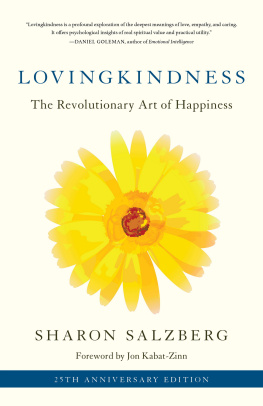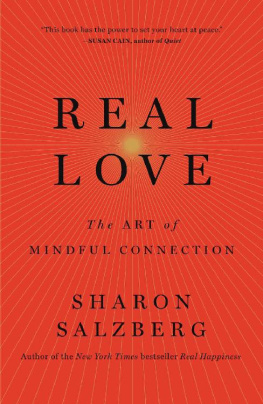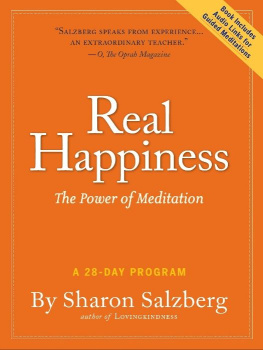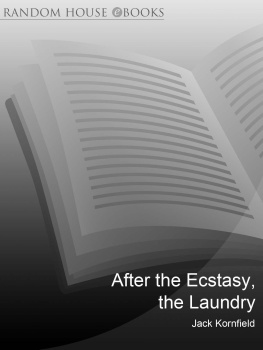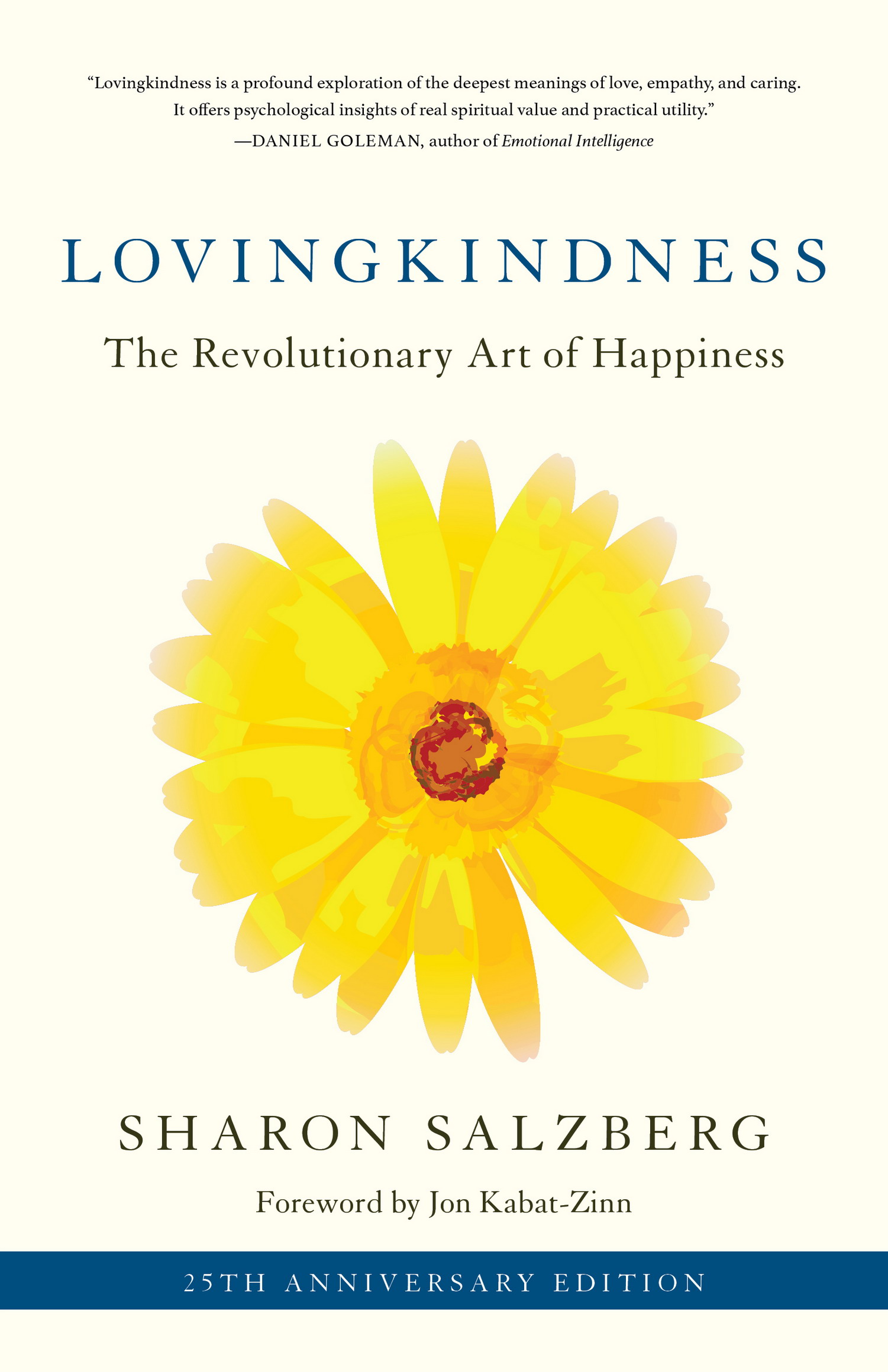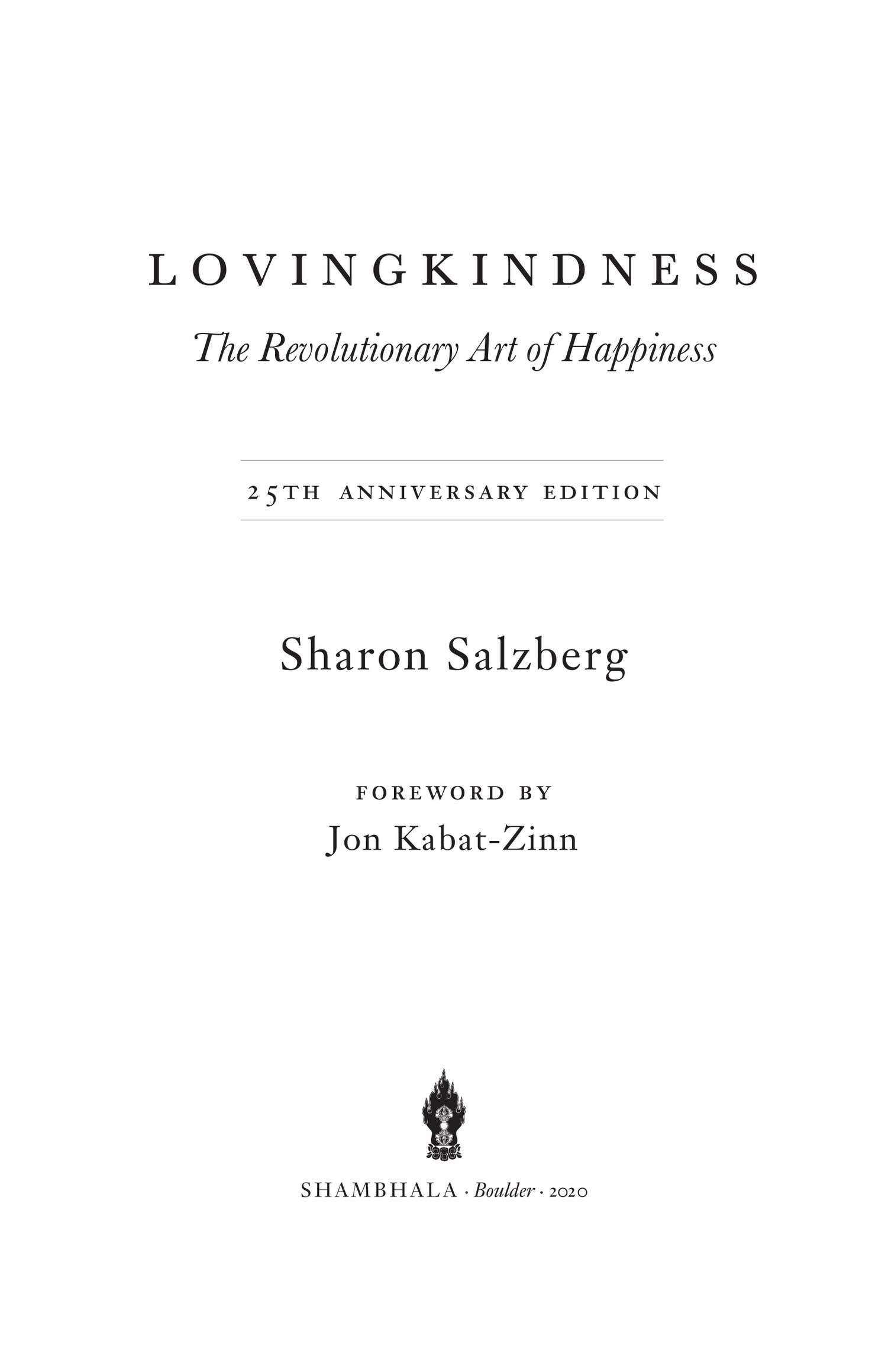Contents
Landmarks
Print Page List
S HAMBHALA P UBLICATIONS , I NC .
4720 Walnut Street
Boulder, Colorado 80301
www.shambhala.com
1995 by Sharon Salzberg
Foreword 1995 by Jon Kabat-Zinn
Afterword 2020 by Sharon Salzberg
constitutes an extension of this copyright page. All rights reserved. No part of this book may be reproduced in any form or by any means, electronic or mechanical, including photocopying, recording, or by any information storage and retrieval system, without permission in writing from the publisher.
Cover art by Sakiko Nakano/Shutterstock
Cover design by Rebecca Lown
T HE L IBRARY OF C ONGRESS CATALOGUES THE PREVIOUS EDITION OF THIS BOOK AS FOLLOWS :
Salzberg, Sharon.
Lovingkindness: the revolutionary art of happiness/
Sharon Salzberg.1st ed.
p. cm.
ISBN 978-1-57062-037-9 (hardcover)
ISBN 978-1-57062-176-5 (paperback)
eISBN 9780834842731
ISBN 978-1-57062-903-7 (Shambhala Classics)
ISBN 978-1-61180-624-3 (Shambhala Pocket Library)
ISBN 978-1-61180-820-9 (25th anniversary edition)
1. MeditationBuddhism. 2. Compassion (Buddhism)
1. Title.
BQ 5612.S25 1995 94-30379
294.3443 dc20 CIP
v5.4
a
This is what should be done
By those who are skilled in goodness,
And who know the path of peace:
Let them be able and upright,
Straightforward and gentle in speech.
Humble and not conceited,
Contented and easily satisfied.
Unburdened with duties and frugal in their ways.
Peaceful and calm, and wise and skillful,
Not proud and demanding in nature.
Let them not do the slightest thing
That the wise would later reprove.
Wishing: in gladness and in safety,
May all beings be at ease.
Whatever living beings there may be;
Whether they are weak or strong, omitting none,
The great or the mighty, medium, short or small,
The seen and the unseen,
Those living near and far away,
Those born and to-be-born
May all beings be at ease!
Let none deceive another,
Or despise any being in any state.
Let none through anger or ill-will
Wish harm upon another.
Even as a mother protects with her life
Her child, her only child,
So with a boundless heart
Should one cherish all living beings;
Radiating kindness over the entire world:
Spreading upward to the skies,
And downward to the depths;
Outward and unbounded,
Freed from hatred and ill-will.
Whether standing or walking, seated or lying down,
Free from drowsiness,
One should sustain this recollection.
This is said to be the sublime abiding.
By not holding to fixed views,
The pure-hearted one, having clarity of vision,
Being freed from all sense desires,
Is not born again into this world.
The Buddhas words on lovingkindness
(Metta Sutta)
Contents
Foreword
M ANY OF S HARON S ALZBERG S readers will know that over the main portal of the Insight Meditation Society in Barre, Massachusetts, where she teaches, is inscribed in large letters the word metta, Pali for lovingkindness. Some may have wondered, as I have on occasion, why that particular word is up there rather than, say, mindfulness or insight or equanimity or wisdom or compassion. For me, in the end, all these qualities, which we cultivate in meditation practice on long retreats at places such as IMS and in our daily lives wherever we find ourselves, distill down to this simple quality of heart and whether and how we allow it to express itself in the minute daily conduct of our lives, both toward ourselves and toward others.
The Dalai Lama has said: My religion is kindness. If we all adopted such a stance and embodied it in thought and action, inner and outer peace would be immediate, for in reality they are never not present, only obscured, waiting to be discovered. This is the work and the power of lovingkindness, the embrace that allows no separation between self, others, and eventsthe affirmation and honoring of a core goodness in others and in oneself. The practice of lovingkindness is, in fact, the ground of mindfulness practice, requiring the same nonjudging, nongrasping, nonrejecting orientation toward the present moment, an orientation that invites and makes room for calmness, clarity of mind and heart, and understanding.
In this book, Sharon shows us how we might systematically cultivate lovingkindness in our lives. Given the pain and turmoil that we often experience, the endemic misperceptions of the human mind regarding who and what we are, and how we relate to the stress and pain of our lives, practicing lovingkindness is an arduous disciplineno less so than attending to ones breathing or observing the stream of ones thought. But it is an extremely effective path, a fundamental path in the opening of mind and heart. In it are to be found the seeds of profound happiness, inner well-being, and healing for ourselves and for all the beings, human and otherwise, all miraculous, with whom we share this fragile living planet. May this book help further that process far and wide.
Jon Kabat-Zinn
July 1994
Acknowledgments
T HOSE TEACHERS , FRIENDS , and students who in the course of my life have helped me learn about lovingkindness are too numerous to mention. Some who have specifically aided me with this book are as follows.
Steve Smith and Alan Clements, who first inspired me to go to Burma. Rand Engel, who suggested I write a book on lovingkindness. Joseph Goldstein, who has gone with me on every turn of this path and most recently taught me how to handle troublesome chapters.
Barbara Gates, who edited with enormous grace and skill, and taught me some essential elements of writing. Ann Barker, Sarah Doering, Catherine Ingram, Kate Wheeler, Judith Stanton, and Dorothy Austin, who offered me unflagging support as well as editorial suggestions and creative consults. The staff and teachers of IMS, who devote themselves to these teachings.
Eric Kolvig, who began the project with me, whose outstanding editing skills made it all possible, and who made critical contributions to several chapters. David Berman, who taught me six of the seven things I can do on a computer, who heroically flew back in the middle of winter to help, and who helped unstintingly right through to the end.
The writers club: Tara Bennett-Goleman, Susan Harris, Dan Goleman, Ram Dass, Kedar Harris, and Joseph Goldstein, who contributed continual inspiration and some helpful peer pressure. Susan Harris for the gift of a computer and a revolutionary friendship. Tara Bennett-Goleman and Kate Wheeler, who generously spent so many hours contemplating titles. Anasuya Weil, who did so much transcribing, and who never stopped asking me about the book.
Kedar Harris, who was absolutely fearless in saying what he thought, and whose comments on my early versions were all too true. Jack Kornfield, who has been my advocate. Shoshana Alexander, who put aside her own work to so beautifully facilitate the flow of mine through her unique editorial abilities. Surya Das, who lugged my computer through LaGuardia, and who introduced me to people who recast my knowledge of love and compassion.

